For reasons that are perhaps only clear to the gods of Reddit themselves, I got some 2500 extra hits on my blog over the course of a couple of days, due to (I guess) someone in Ecuador getting fleeced in the food purchasing department, and someone else holding out my blog as an example of what you could get in Chile for the same amount of money. I have a Reddit account, mainly to respond to what people say about the blog, which is a little like buying clothing for your pet, but this is the modern age, where I FB post about tweets and tweet about Reddit and then blog about Reddit and put it on my Facebook page.
One person on Reddit posted that he was not impressed with my prices, specifically apples, because he could buy them for within 20 cents of a dollar, and I had reported paying 400 clp (less than a dollar) for a kilo. That actually means I paid 38 cents per pound (400 CLP = 84 cents, divided by 2.2, which is how many kilos are in a pound) = 38, but whatever. I don’t need to argue with faraway people about whether or not I overpaid at the feria, but I did point out that Chile is not cheap, quoting prices on gasoline and cream cheese (both high, gas is more than $6 a gallon, and cream cheese, when purchased at the supermarket, costs near $5 a brick).
But it got me to thinking, why is this here? What is the purpose of the feria report? (besides fun for me)
1. it allows me to track prices year over year without a pesky spreadsheet. True, I will have to go back and comb through my blogs to find the data, but I was thinking of hiring some minions to do it. I thought of hiring a minyan, but that’s too many people (Haha, Jewish joke, a minyan is 10 above-barmitzvah-aged males, enough to study the Torah). Anyway, the minion thing is a joke. The first thing that person would do is give my kitchen a good scrubbing.
2. It gives a real-life view to people considering moving to Chile, of the prices we pay for food. On gringo forums and fb pages, people always compare the prices of what we eat here to what they ate there. I make no assurances about our produce being cheaper (though most of the time it is), just a real-view look at how much it costs. The Vega is cheaper, but not cheap enough for me to go when I have my local ferias so close, and the people there kind of love me (see: on Saturdays I wake up pretty, Sundays, sometimes too.
3. It gives a shout out to buying from small-business people.
4. It helps me to point out the high prices we pay at the supermarket vs. the feria, or at least give data to people who might be interested in making that comparison.
5. It helps to remind me what we can get in season, and when, though the what we can get has changed quite a bit, especially as there is more Peruvian immigration and Chileans go progressively more cuckoo (in a good way) for Peruvian food.
And so here’s what it looks like. I bought several things this week that I didn’t buy last week, some of which may or may not come to your grocery shelves (thus the exotics). And if they come this time of year, they probably come from here, so bid them a fine hello when you see them, as they have come from far away.
Cauliflower 600 clp = $1.27
Broccoli 600 clp = $1.27
Giant swiss chard 1000 clp = $2.10
Arugula 300 clp = $.63
Parsley 200 clp = $.42
Cilantro 200 clp = $.42
Avocado 500 clp = $1.05
3 Tiny pica mangoes 800 clp = $1.68
8 Pica lemons (similar to key limes) 500 clp = $1.05
2 passion fruit 500 clp = $1.05
1 sweet potato 200 clp = $.42
1 pomegranate 400 clp = $.84
2 pepino dulce (cucumber fruit) 400 clp = $.84
2 persimmons 900 clp = $1.90
Bunch carrots (7) 400 clp = $.84
3 Green onions 400 clp = $.84
Big “cut” of squash 300 clp = $.63
Iceberg lettuce 500 clp = $1.05
(The passionfruit, sweet potato, tiny limes and small mangoes I bought from the same place, so I split up the price how I think it added up, but the total is correct.) These are all luxury food items, for what it’s worth, though maybe less-so the sweet potato.
Today’s impulse purchase were the persimmons, which are soft as room-temperature butter, and delicious. I wasn’t going to buy any, but the pepino dulce woman cut off a giant piece of one she was eating and handed it to me, and I tasted it, and then said the words, “Es un manjar,” which would mean “it is a dulce de leche/milk fudge” if you took it with the common use of the word manjar, but in this case it means “It is heavenly,” or more precisely “this is like the nectar of the gods.” It’s flowery speech, but this is part of the experience of buying at the feria, and those persimmons are darn good.
The total price of all of this, if we trust my math, is $18.30, which is about 8700 pesos, or what an entreé at a niceish (but not necessarily good) restaurant will cost you in Santiago. It is also about 13 peak-hour bus or metro trips, or 2.2 percent of the average monthly Chilean salary (pegged at 390,000 by the last count), and 4.5 percent of the monthly minimum wage for workers aged 18 to 65, which is currently set at 193,000.
Which is to say, me fui al chancho with the fruits and veggies (literally, I went to the pig, but really means, “I overdid it,” and if I were Chilean I not only did that, but also forgot the potatoes, tomatoes and onions.

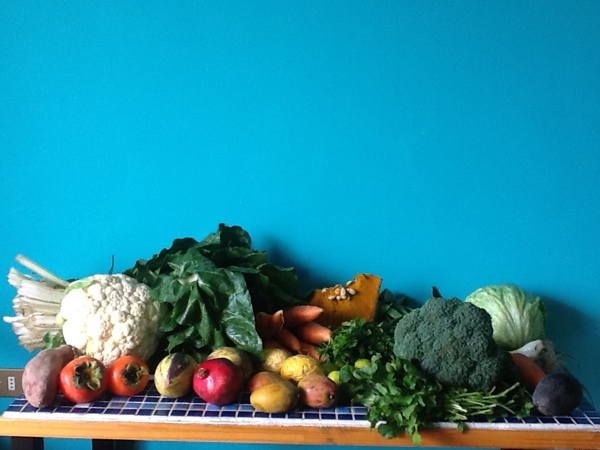
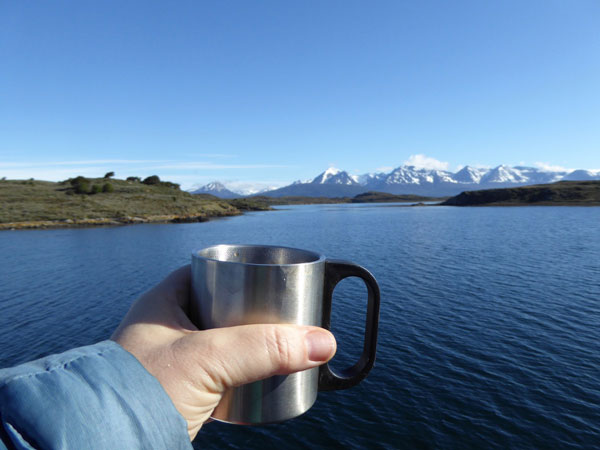
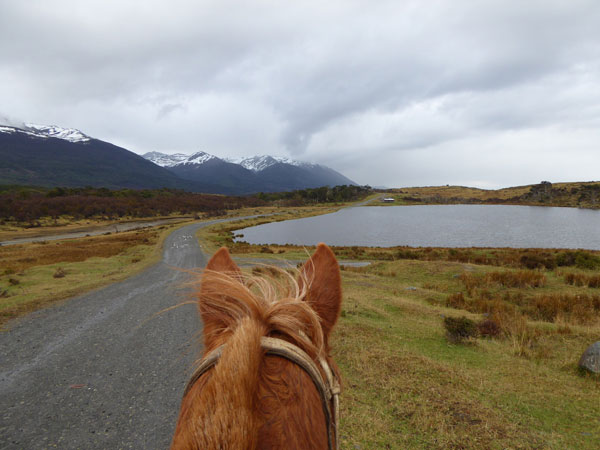

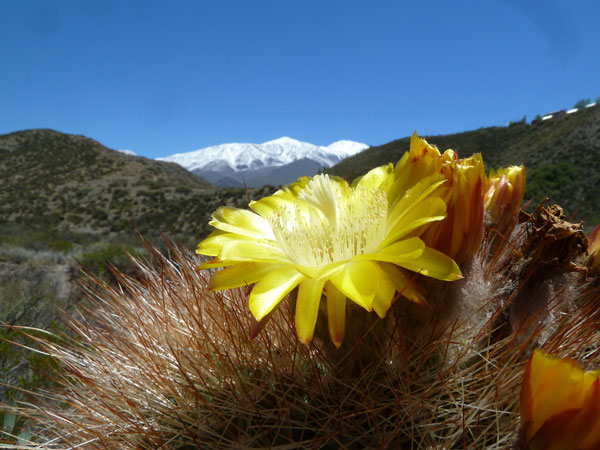

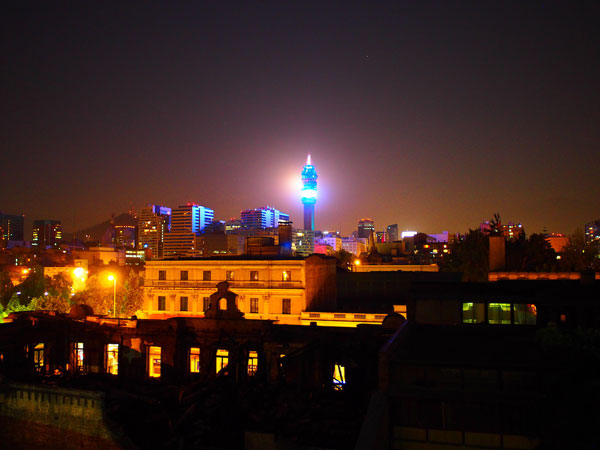
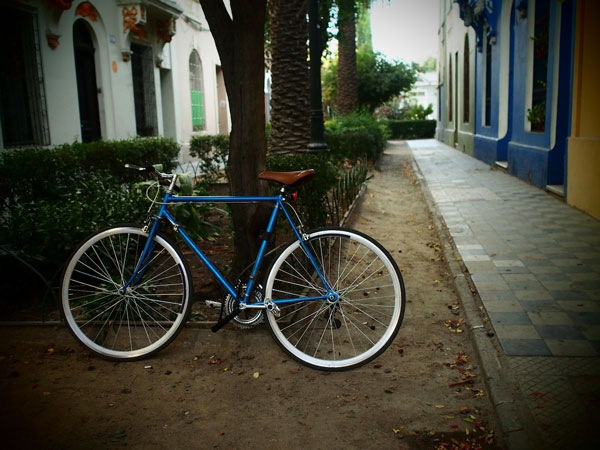


Caquis! Mi mamá se volvió loca comprando esta semana y están tan, tan, TAN ricos :3
Y sobre las ferias, seh. La Vega sí tiene cosas bien baratas, pero sólo resulta conveniente si lo que necesitas es comprar por montones. A mí me gusta porque en Mapocho hay harto puesto de comidas peruanas (con lo que pruebo tu teoría :P) y está el mercado y las tiendas de quesos cerquita (y tostadurías y tiendas con tortillas de arroz chinas), así que yendo seguido casi se puede reemplazar al supermercado. Pero me da flojera y la feria está tan cerca…
Cual feria es esa de Mapocho? quizás la que voy los días sábado? Pensé que era en Andés pero queda cerca, en todo caso. Y sí, a veces no conviene la feria, pero intento ir mínimo 2-3 veces al mes. Si no, no como tan bien, y gasto mas plata! Aunque a propósito de irse al chancho, el atado de acelga que compré? 3 kilos. Lo tendré hasta la coronilla luego!
Gracias por pasar y comentar! ñami ñami caquis!
Oops, Mapocho como en Estación Mapocho, no calle Mapocho. Siempre se me olvida aclarar!
Así que a puro comer garbanzos con acelgas y acelgas con crema por el próximo mes? 😛
sag paneer, pues! reemplazando la espinaca (cara!) con acelga (barata!). Y delicioso. Justo me quedan dos tomates. mmmm ñami. También tortillas de acelga, quizás que mas. Ahí te cuento. Ya cociné unos 2/3, pero lo demás no cabía en ninguna olla! Tremendo atao. jajaja.